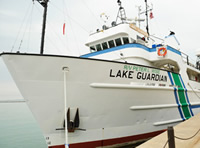
Teachers spent a week on Lake Superior aboard the research vessel Lake Guardian.
Teachers from the Great Lakes area studying on board a research vessel on Lake Superior were to return today to Duluth, Minn. where their journey began.
The Shipboard and Shoreline science workshop set sail on the U.S. Environmental Protection Agency’s research vessel Lake Guardian on July 20.
The workshop provided 15 teachers the chance to work with researchers and scientists. Great Lakes basin residents who teach or are willing to teach about the Great Lakes and marine science in formal or non-formal settings were included in the pool of applicants, according to the Centers for Ocean Sciences Education Excellence.
“I remember seeing working ships off the coast at night and wondering, what do they do out there? Now we’re the ones working out at sea. It’s just thrilling,” John Weimholt, a teacher at Hazel Park Preparatory Academy in St. Paul, Minn., wrote in an email sent from the vessel.
One of the main aims of the workshop is to provide a first-person experience of science.
“We want them to have hands on experience with the Great Lakes [and] work one-on-one with the scientists to take Great Lakes science into the classroom,” said Joel Hoffman, a research biologist at the U.S. Environmental Protection Agency National Health and Environmental Effects Research Lab.
Weimholt often teaches about Lake Superior. He takes kids on hikes exploring the birds and mammals and examining the geologic and glacial history of the region.
But this was different.
“I’ve never studied the lake from the perspective of being in the lake,” he said. “When I learned of this workshop, it just seemed like a perfect match for me.”
The teachers collected data and developed classroom activities. Lake Superior was checked for harmful algae by Greg Boyer from State University of New York’s College of Environmental Sciences and Forestry, Hoffman said.
“Science is such an important issue for young people to be educated in,” said Melissa Anley-Mills, a member of the science communication staff for the U.S. Environmental Protection Agency.
It wasn’t all shipboard research.
“We’ve heard lectures by experts from around the country on all sorts of Great Lakes topics. We’ve been touring museums and research facilities, superfund sites and recovering estuaries,” wrote Weimholt. “We’ve been learning about the many Great Lakes resources and curricula available to teachers and how we can implement them.”
The ultimate idea is to benefit students.
“We hope that when the teachers go back to their classrooms they have a powerful understanding of what science is,” said Deanna Erickson, education assistant at Centers for Ocean Sciences Education Excellence. “[This] is much more real than a textbook experience.”
Weimholt said the workshop will help him better understand the scientific process and communicate how scientists use technology to analyze problems and devise solutions.
“It will give me the tools and knowledge to do some really exciting field work with my students and get them excited about science and their environment,” he wrote.
The project was started five years ago by the Centers for Ocean Sciences Education Excellence. It is collaboration between the U.S. Environmental Protection Agency, Centers for Ocean Sciences Education Excellence Great Lakes and the Great Lakes Sea Grant Network.
During the course of the workshop researchers investigated the efforts to improve near-shore water quality, she said.
It also demonstrated how human actions on land affect the water, said Anley-Mills.
Educators and researchers shared their findings through a daily blog and podcasts on the Environmental Protection Agency’s website.
Experts have also been answering questions about the Great Lakes submitted by the public every day.
It’s not just the teachers who benefit.
The workshop also gives scientists a chance to look at science through educators and learn what and how they need to communicate with people, Erickson said.